Doctors Without Borders/Médecins Sans Frontières (MSF) medical referent Karin Huster has been to Gaza on assignment three times since the escalation of the current conflict in 2023, and has witnessed how already-dire conditions have worsened amid continued displacement and attacks by Israeli forces. Here, she shares an account of what she saw during her recent assignment.
Photos provided by Karin Huster
Karin Huster, MSF medical referent:
It's kind of hard for me not to cry about this, because I don't think I have seen an army that has been so ... nonstop in its aggression toward a civilian population—and more specifically, toward children and women who we all know very well have nothing to do with the original aim of the Israeli army, which was to get rid of Hamas.
The number of children and women that we see in the emergency rooms of the hospitals that we work in is just mind-boggling. And the number of kids I have seen with amputated arms or legs, or kids who were killed is just mind- boggling.
In June, I was working at Al-Aqsa [hospital in Deir al-Balah]. I was responsible for the medical activities there. And the Israeli forces came in to Nuseirat camp to free four hostages. When they did so, they killed—you know, call them collateral damage—I don't know, well over 300 people. I was in the emergency room. We were asked by the director of the hospital to come in.
It was as if I had a 747 [airliner] in the emergency room. There were people of all ages. There were hundreds of people—dead, not dead, legs blown off, people being intubated on the floor, chest tubes being put [in] with no infection prevention control. It was just complete chaos.
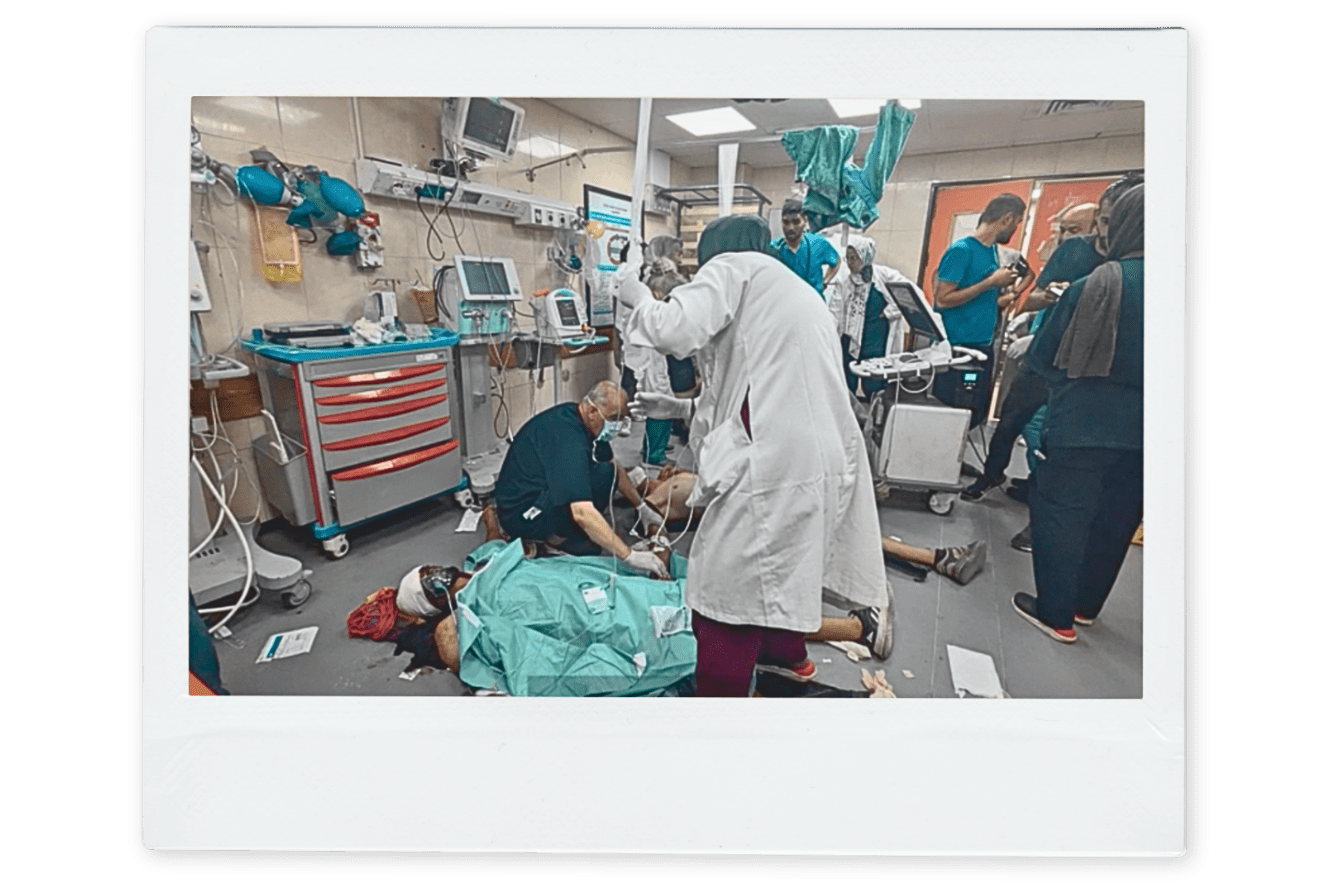
This [photo] is inside Al-Aqsa Hospital, in the intensive care unit. This is in the red zone area. As you can see, there are no beds right now. It's complete chaos. You have people who are being intubated, cared for on the ground, dead, or going to die any minute. And it was such chaos that I had to push bodies to the side so that we could bring more bodies to take care of. It was something that I had not seen before—just the sheer number of casualties would overwhelm any hospital. And Al-Aqsa had been the one standing general hospital, so it was receiving all the casualties of Israeli strikes.
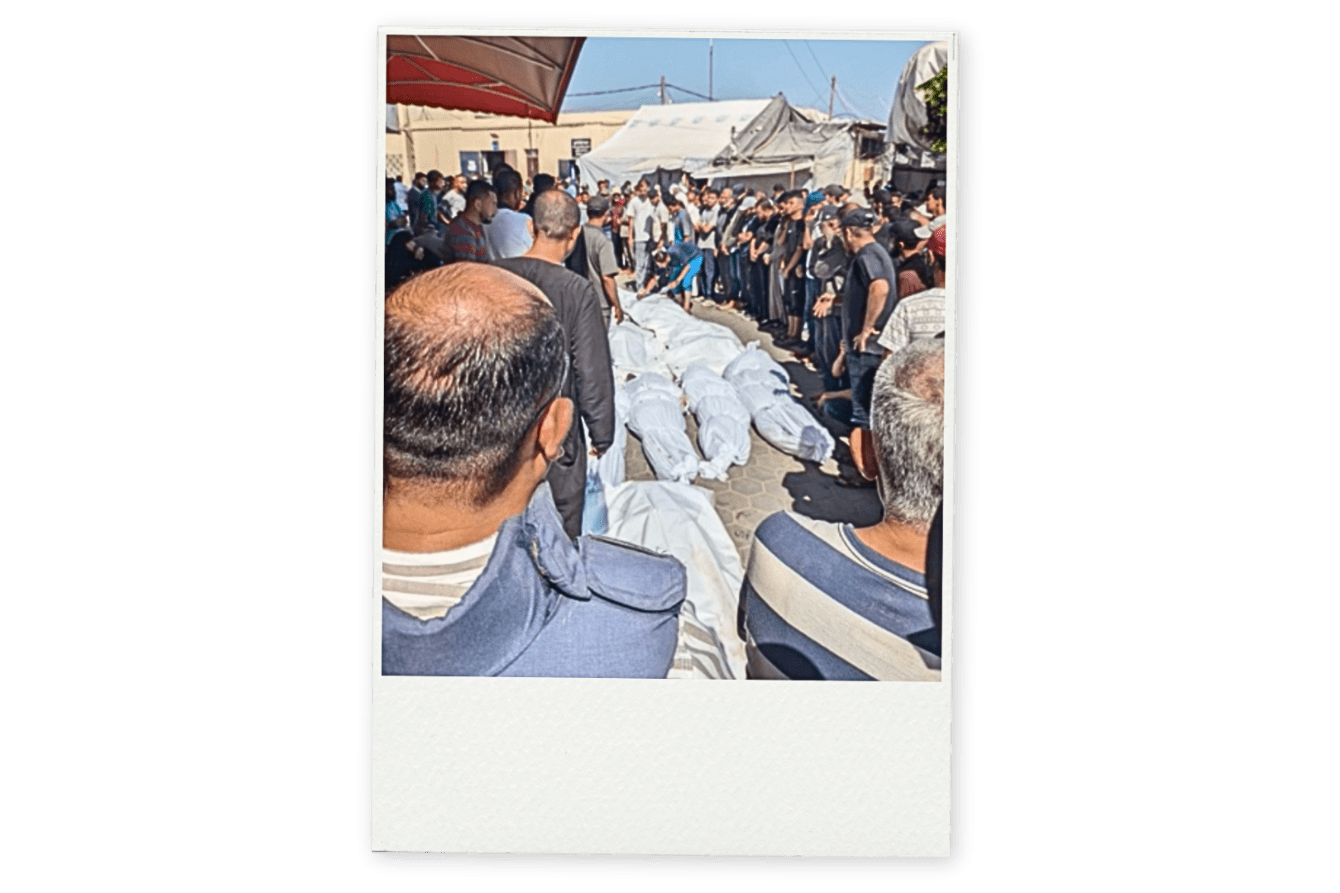
Every casualty and every death comes to Al-Aqsa Hospital, where they are counted and recorded and then wrapped in a body bag or body cloth and laid in front of the hospital. All the men stand in front of the bodies and pay their last respects. This doesn't last very long, but it's done with every single body that comes into Al-Aqsa Hospital [whether they] came dead or died in the hospital. Eventually the bodies will make their way here, and they will have this prayer that lasts a few minutes. And then the families will take the bodies and bury them.
Extremely poor conditions for the displaced
The obstruction of supplies and medical equipment by the Israeli forces is constant. For example, we are constantly lacking essential medication, antibiotics, gauze, [and] tools to do surgeries. We're lacking food. Food is being prevented from coming in. Of course, people will try to go and take whatever food is there from wherever they can find it.
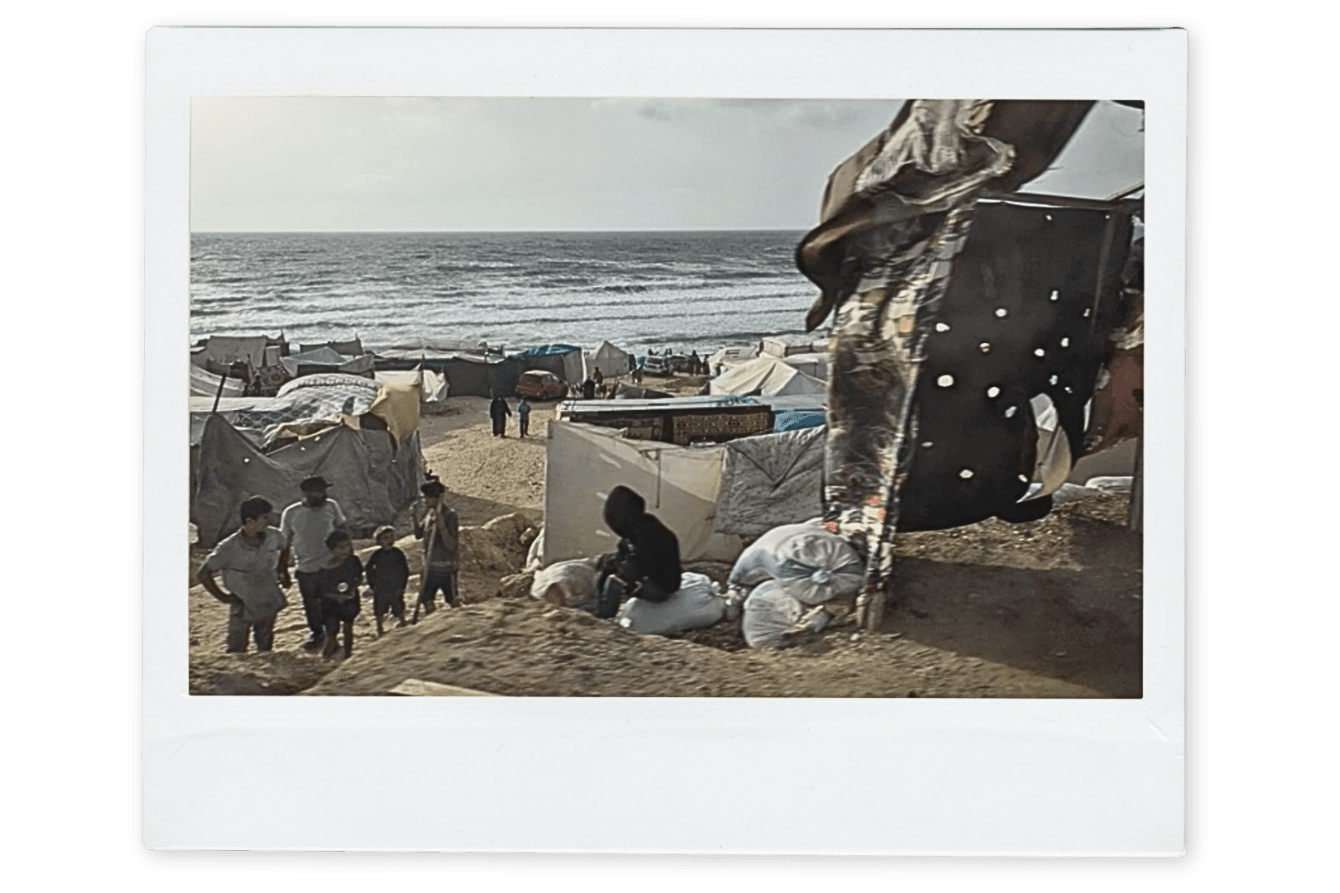
This photo is particularly shocking to me because when I came in January, this beach didn't have a single tent. In fact, I rode in a car with a patient who was critically sick at 100 kilometers [62 miles] an hour on this road. Today, I cannot ride more than 10 kilometers [6 miles] an hour on this road because there are tents everywhere.
The population of Rafah—which was about 1.4 million or 1.5 million because of all the people who had moved from the north—that population then was pushed back to the Middle Area. And there is no space, not only because the buildings are destroyed, but also because there is just no infrastructure.
So where have people gone? They have gone to the beach, but they don't have tents. They don't have any structure that is going to withstand the elements. They have just a carpet or old mattresses, a piece of plastic, a few pieces of wood that hold the whole thing together. Today the whole beach is jam-packed with those flimsy structures and it's winter now, and the storms in Gaza are nasty. You have kids who are on the brink of malnutrition living in [poor] conditions. They will get super sick because of the elements.
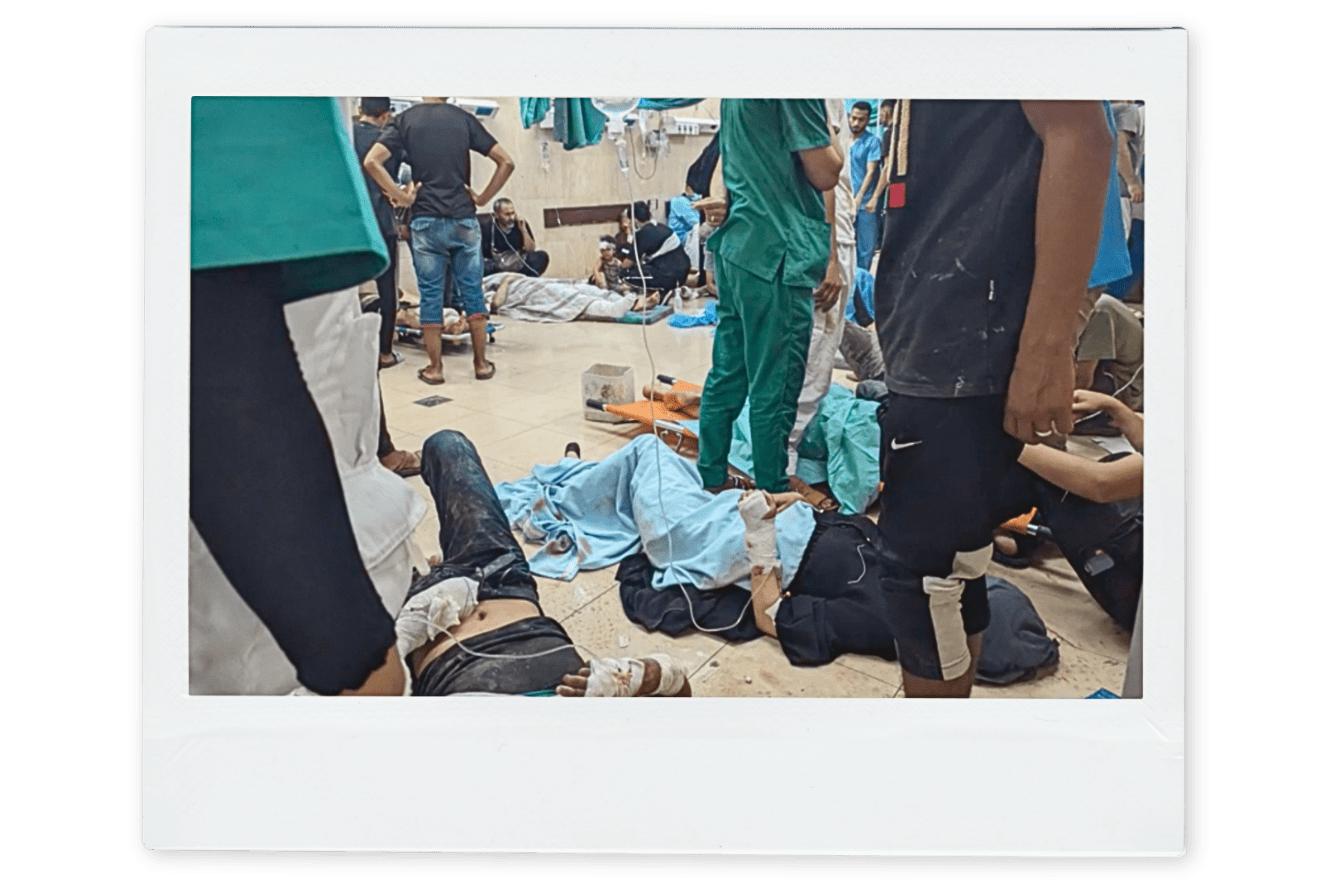
People need urgent medical evacuation
Some patients need to be taken to other countries because the capacity in Gaza is no longer there. It is mind-boggling to me that the Israeli forces and the Israeli government continue to block the medical evacuations of those patients. We're talking children with cancer. We're talking wounded people with devastating injuries that can be salvageable. We're talking children with amputations that can be much better managed outside of Gaza. We're talking all kinds of medical conditions that should be allowed to be treated outside, yet are not.
Why forbid a 4-year-old child to leave the enclave when they know very well that this child has no hope of survival because of the war that's going on? They should be able to leave.
The governments of Europe, the United States, Saudi Arabia, Qatar—there are so many countries that should be able to take these patients. It's the only human thing to do, it seems to me. Yet we're not seeing any visible effort, any goodwill, any genuine interest from the rest of the world to take care of these people.
This has nothing to do with politics. This has just to do with being a human being and caring for others. The medical consequences for patients who are unable to leave are obviously catastrophic already.
The future for them is bleak, but the future without both legs—without the hope of getting treated in a hospital that has everything for you to be treated—the consequences are catastrophic for them. It's just terrible. I don't think I have enough words to describe the cruelty that is happening. And this is not one family—this is one family after another.
When I look at the list [of patients in need of evacuation] and when I see the conditions in which people are living, yes, they need to be taken care of somewhere else because the capacity inside of Gaza is gone. It's been obliterated by the Israeli forces—willingly. Schools, universities, mosques, hospitals, everything is destroyed. Everything so that you cannot stay because there is nothing to stay for.
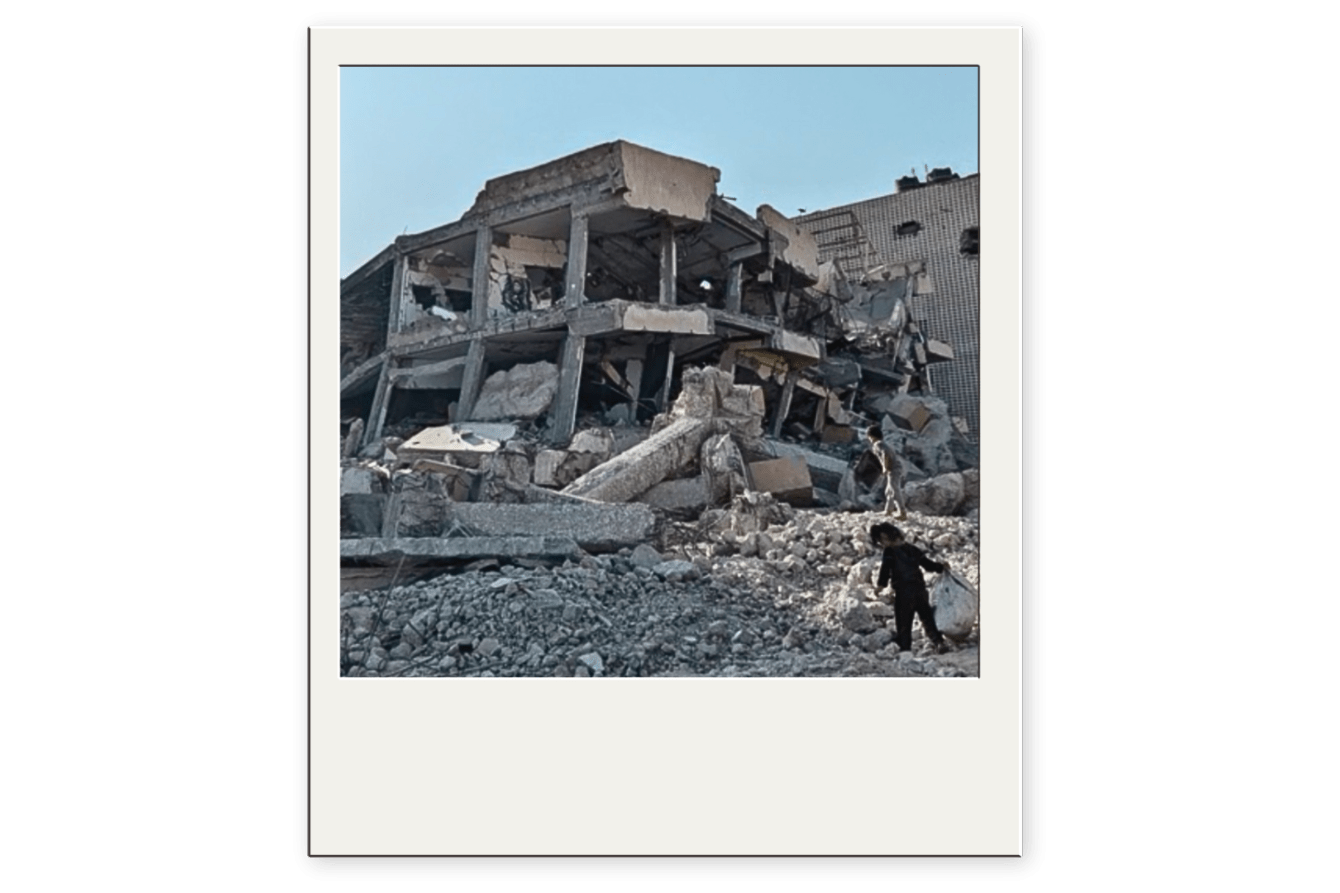
This is a picture of a building like many other buildings in Khan Younis. I took this photo driving to Nasser Hospital. As it happens in Gaza, they there is a lot of graffiti inside destroyed buildings or on big slabs of wall that have been destroyed. And what I have been told is that, when there is somebody under the rubble who has not been able to be taken out to be buried, they will often do a painting of that person. I don't think this is something that happens all the time, but this is something that they do regularly.
Living on borrowed time
The level of destruction in the north is, if we can imagine, is even worse than the level of destruction in Rafah or Khan Younis. I think for me, even when I look at, Khan Younis or at Rafah today, it's not possible to rebuild those places. They are destroyed beyond reconstruction.
People are living in their destroyed homes. They will put down a carpet, whatever it is that they can, and then they live there. There is no work, there is nothing. But this is their home and that's where they want to stay. And what's worse is to think that this apocalypse is man-made and it is willingly made. None of this destruction was left by chance.
Palestinians in Gaza live on borrowed time. It's only a matter of time before you die in Gaza.
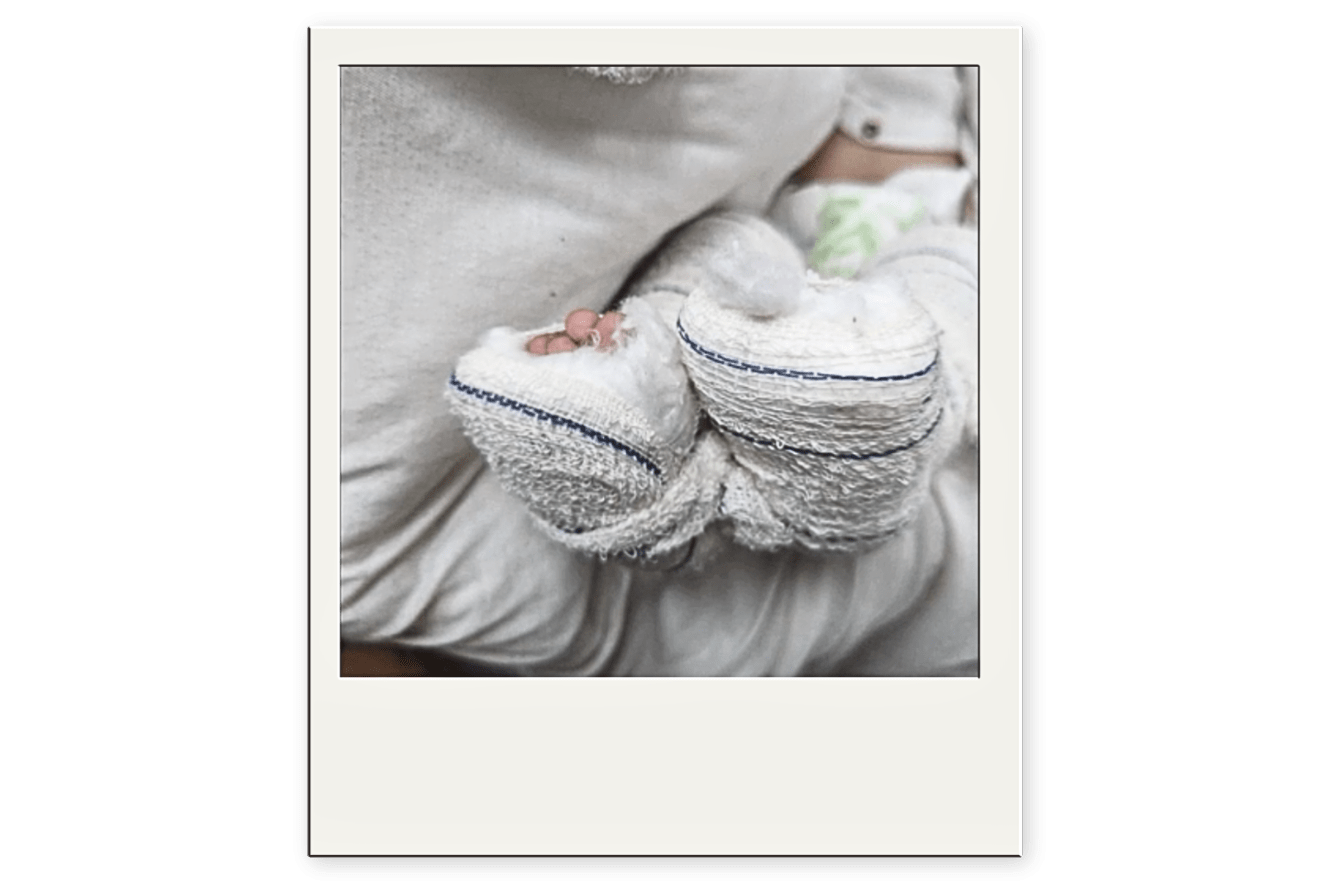
This is a picture of these little feet of a baby during that June attack when the Israeli forces went to free the four hostages in Nuseirat. This was one of the victims of the Israeli strikes when I was in Al-Aqsa Hospital, when I came into the emergency room and there were, I don't know, hundreds of people lying on the floor, and there was this little kid. I think she was maybe 2 or 3 years old. And she just seemed to be sleeping in the fetal position, all alone. And we all know that Palestinian families are always there with their children. Their children are, you know, [a gift from] God. So you don't leave a kid on its own.
But somehow this kid was there on her own. Nobody was paying attention to her. I'm a mom, so I went to this kid, obviously. Then I went to talk to a nurse who said that she'd had a head injury and she was probably not doing very well. [She looked like she] was sleeping, but maybe she was in a coma. I knew I couldn't do very much for her. And even though there were other patients that I probably needed to do something else for, I just wanted to take this kid in my arms and just stay there.
We speak out. Get updates.

Timeline: One year of bearing witness to all-out war in Gaza
A grim milestone for Palestinians in Gaza suffering under siege and bombardment.




